Related Research Articles
Politics in Estonia takes place in a framework of a parliamentary representative democratic republic, whereby the Prime Minister of Estonia is the head of government, and of a multi-party system. Legislative power is vested in the Estonian parliament. Executive power is exercised by the government, which is led by the prime minister. The judiciary is independent of the executive and the legislature. Estonia is a member of the United Nations, the European Union, and NATO.

Konstantin Päts was an Estonian statesman and the country's president in 1938–1940. Päts was one of the most influential politicians of the independent democratic Republic of Estonia, and during the two decades prior to World War II he also served five times as the country's prime minister. After the 16–17 June 1940 Soviet invasion and occupation of Estonia, President Päts remained formally in office for over a month, until he was forced to resign, imprisoned by the new Stalinist regime, and deported to the USSR, where he died in 1956.
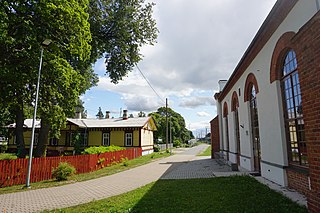
Aegviidu is a borough in Anija Parish, Harju County, Estonia, most known for its picturesque surroundings and hiking trails.

Mart Sander is an Estonian singer, actor, director, author, artist, and television host.

The Estonian Academy of Music and Theatre began as a mixed choir of the Estonia Society Musical Department (EMD) on the eve of World War I. The assembly of the Estonia Society created the Tallinn Higher Music School on November 17, 1918. The opening ceremony took place on September 28, 1919. In 1923 the educational institution was renamed the Tallinn Conservatoire. In 1938 the State Drama School was opened. In 1993 the school was renamed the Estonian Academy of Music. In 1995 the Drama Faculty was renamed the Higher Theatre School.

Pärnu Rannastaadion is a multi-purpose stadium in Pärnu, Estonia. It is currently used mostly for football matches and is the home ground of Pärnu JK Vaprus and PJK. The stadium was opened after reconstruction in 2016 and seats 1,501. The address of the stadium is Ranna pst. 2, 80012 Pärnu.
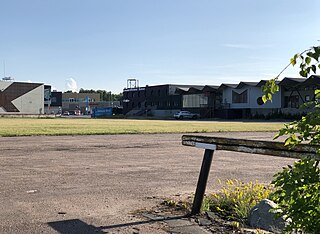
Viimsi staadion was a multi-purpose stadium in Haabneeme, Viimsi Parish, Estonia, just outside the capital Tallinn. It was opened in 1975 and at its peak had a capacity of 3,000. The stadium was formerly used by the now-defunct Lantana Tallinn football club.

The Estonian Defence League is a voluntary organization of the Republic of Estonia, under management of the Ministry of Defence. Its aim is to guarantee the preservation of the independence and sovereignty of the state, the integrity of its land area and its constitutional order.

Hiiu Stadium is a football stadium in Tallinn, Estonia. Opened in 1936, it is the home ground of Nõmme Kalju FC. The stadium is located about 8 km southwest of the city centre, in the district of Nõmme. The address of the stadium is Pidu tänav 11, Tallinn.

The Estonian Defence Forces is the unified military force of the Republic of Estonia. The Estonian Defence Forces consists of the Estonian Land Forces, the Estonian Navy, the Estonian Air Force, and the paramilitary Estonian Defence League. The national defence policy aims to guarantee the preservation of the independence and sovereignty of the state, the integrity of its land area, territorial waters, airspace and its constitutional order. Its main goals remain the development and maintenance of a credible capability to defend the nation's vital interests and development of the defence forces in a way that ensures their interoperability with the armed forces of NATO and European Union member states to participate in the full range of missions for these military alliances.
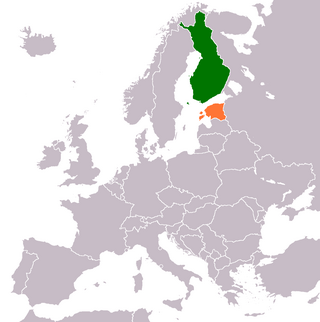
Estonia–Finland relations are foreign relations between Finland and Estonia. The independent Republic of Finland, established in 1917, and the independent Republic of Estonia, established in 1918, established diplomatic relations and formally recognised each other in 1920. Diplomatic relations between the two countries were interrupted during World War II and officially restored on 29 August 1991. Finland has an embassy in Tallinn and an honorary consulate in Tartu. Estonia has an embassy in Helsinki and five honorary consulates, located in Oulu, Turku, Ekenäs, Tampere and Kotka. Both countries are full members of the Council of the Baltic Sea States, Council of Europe, European Union, NATO and the Eurozone. Finland has given full support to Estonia's membership of the European Union. Estonia also has strongly supported Finland's NATO membership. The majority languages in both countries are Finnic languages, as Finland's main language, Finnish, is related to Estonian, and there is and has been a certain feeling of kinship. 76% of Finns have visited Estonia, and in 2004, 1.8 million Finns reported visiting Estonia. The excise tax on alcohol is lower in Estonia than in Finland, thus it is common to buy large volumes of alcohol when returning from Estonia: a study in 2014 indicated that 34% of alcohol sold in Estonia is bought by Finns. Finnish and Swedish investors are the largest foreign investors in Estonia. Both Finland and Estonia are members of the European Union, Schengen agreement and the Eurozone, freeing international travel and trade between the countries. Finland is Estonia's top import partner, accounting for over 15% total import value in 2012, as well as the second-greatest market for Estonia's exports after Sweden. Finland's government recognised Estonia's independence in 1920. In response to the Soviet invasion, diplomatic missions were de facto removed. However, when Estonia restored its independence, this "temporary obstruction" was resolved. During the restoration of Estonia's independence, Finland secretly contributed with significant economic aid and know-how under the cover of "cultural co-operation" in order to not upset the Soviet Union. Finland continues to contribute militarily, such as officers' training, and the provision of equipment.
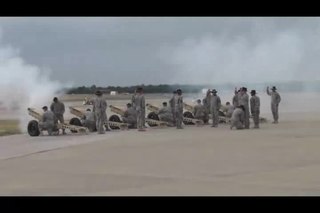
The anthem for a person, office or rank is music played on formal or ceremonial occasions in the presence of the person, office-holder, or rank-holder, especially by a military band. The head of state in many countries is honored with a prescribed piece of music; in some countries the national anthem serves this purpose, while others have a separate royal, presidential, or, historically, imperial anthem. Other officials may also have anthems, such as the vice-regal salute in several Commonwealth realms for the governor-general, governor, or lieutenant governor. Ruffles and flourishes may be played instead of, or preceding, such an anthem.

Björneborgarnas marsch is a Swedish military march from the 18th century. Today, it is mainly performed in Finland and has served as the honorary march of the Finnish Defence Forces since 1918.

Eerik-Niiles Kross is an Estonian politician, diplomat, former chief of intelligence and entrepreneur. He is a member of parliament (Riigikogu). During the 1980s, Kross was a prominent figure in the anti-Soviet non-violent resistance movement in Soviet Estonia. After re-independence, in 1991, he joined Estonia's Foreign Ministry. He served as the head of intelligence from 1995 to 2000; and as national security advisor to former President Lennart Meri in 2000 and 2001.

Kersti Kaljulaid is an Estonian politician who served as the fifth president of Estonia between 2016 and 2021, and was its first and only female head of state since the country declared independence in 1918. She was also the youngest president, aged 46 at the time of her election.

The Kaitseväe orkester, known in Anglophone countries as the Band of the Estonian Defence Forces, is the official military band service of the Estonian Defence Forces. The main task of the band is to play music at all national and military ceremonies. The band's repertoire includes mostly classical and marching music. It is currently made up of 40 musicians. From 1996 to 2019, the conductor of the band was Lieutenant Colonel Peeter Saan. Each year, the band takes part in about 220 concerts, festivals, and ceremonial parades of the Defence Forces. It has also performed at venues abroad in countries like Lithuania, France and Germany. Traditionally, the band holds Autumn and Spring concerts in the Estonia Concert Hall.

Joonatan Jürgenson is an Estonian classical pianist from Tõravere. He made his debut at the age of 12 after receiving the 1st prize at the "Young Musician" competition in Tallinn, 2004.

Eero Spriit, is an Estonian actor, theatre producer and director, and film and television producer. Spriit's career as an actor began in the early 1970s.
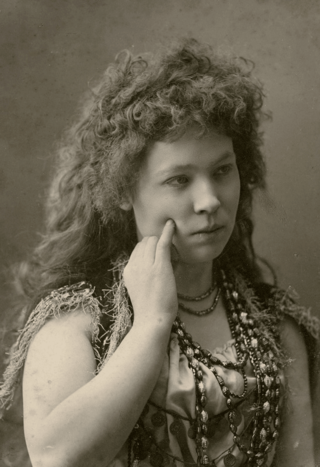
Amalie Konsa, was an Estonian stage actress and singer usually based in Tartu. She was known as the "grandmother of the Estonian theatre"
Eero Liives was an Estonian composer and violinist.
References
- ↑ [ dead link ]
- ↑ [ dead link ]
- ↑ "Eesti rahvusbibliograafia". erb.nlib.ee.
- ↑ "Pidulik marss". DIGAR.
- ↑ "Muusika : [ajakiri] aprill 2018 — DIGAR Eesti artiklid". dea.digar.ee.
- ↑ "Johannes Eduard Liinevi "Pidulikust marsist" Eero Liivese "Tasuleekideni"". Ajakiri Muusika. 4 April 2018.